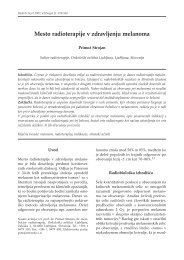You also want an ePaper? Increase the reach of your titles
YUMPU automatically turns print PDFs into web optimized ePapers that Google loves.
Antiprotease therapy in cancer: hot or not ?<br />
María Beatriz Durán Alonso, Cornelis J.F. Van Noorden* and Tamara T. Lah<br />
Department of Genetic Toxicology and Cancer Biology, National Institute of Biology, Ve~na<br />
pot 111, 1000 Ljubljana, Slovenia; *Department of Cell Biology and Histology, Academic<br />
Medical Center, University of Amsterdam, Meibergdreef 15, 1105 AZ Amsterdam,<br />
The Netherlands<br />
There is clear evidence from experimental and clinical studies that proteases are<br />
involved in the spread of cancer. Not only do they play important roles in invasion<br />
and metastasis but also in other stages in cancer progression, namely upregulation<br />
of cell proliferation, downregulation of apoptosis, escape from immune responses,<br />
angiogenesis and the acquisition of multi-drug resistant phenotypes by the cancer<br />
cells.<br />
Despite their known participation in tumour progression, clinical trials using<br />
protease inhibitors have been, to date, mostly disappointing. Several factors may<br />
be accountable for this failure, among them the lack of specificity of many of these<br />
compounds and the late stages of cancer of the patient populations undergoing<br />
these treatments. In addition, the genetic instability of cancer cells allows them to<br />
adapt quickly to new situations. Furthermore, regulation of the proteolytic systems<br />
is highly complex, both in terms of their activation in cascade-like processes and the<br />
effects the interactions between the tumour cells themselves and the surrounding<br />
stroma exert on the expression and, ultimately, the activity of these enzymes. Another<br />
clear obstacle to the development of antiprotease-based anti-cancer treatments is<br />
the lack of an in-depth knowledge of the specific roles played by the individual<br />
proteases and the interplay between them, in tissue- and stage-specific settings.<br />
Further work will be required in order to answer these questions. This, together with<br />
improvements on the specificity and other properties of the protease inhibitors, as<br />
well as the availability of other methods to alter protease activity, such as antibodies<br />
and genetic manipulation, are expected to aid the development of future anti-cancer<br />
therapies where antiprotease approaches may be used in conjunction with cytotoxic<br />
drugs. Promising data, already being obtained with antithrombotics, the urokinasetype<br />
plasminogen activator system, the membrane-bound membrane-type 1-MMP,<br />
cathepsin L, and the proteasome, will be discussed.<br />
l41<br />
59
















